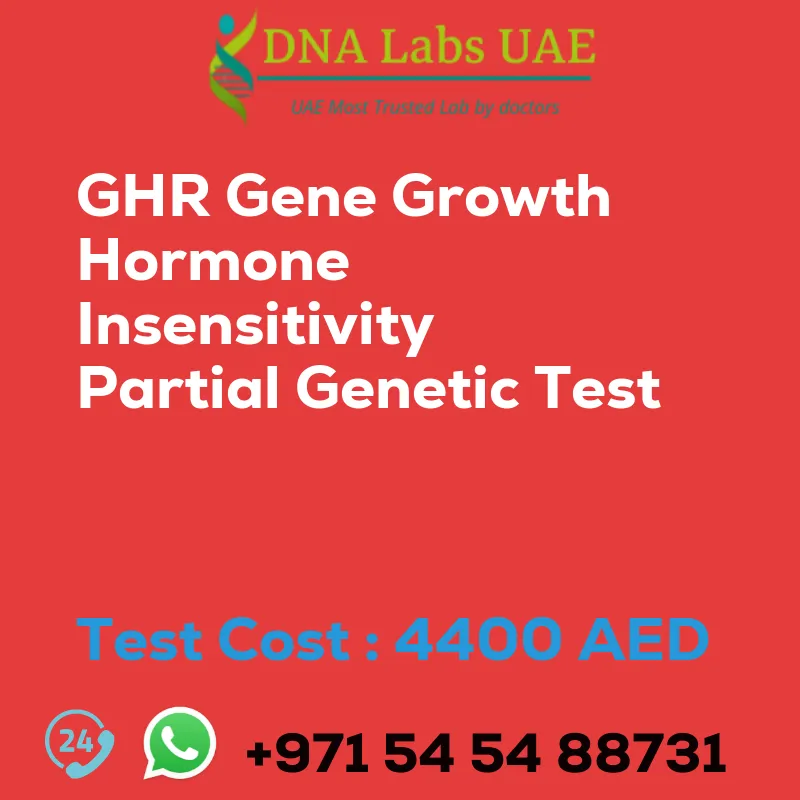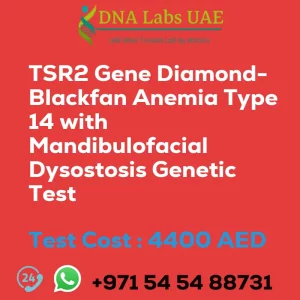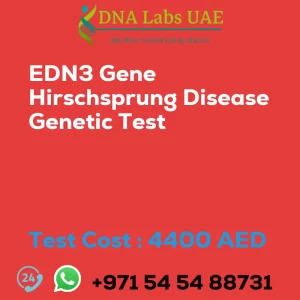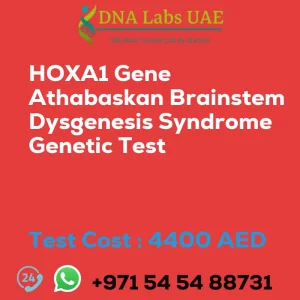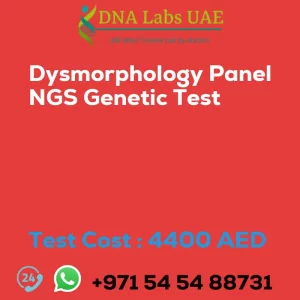GHR Gene Growth Hormone Insensitivity Partial Genetic Test
Welcome to DNA Labs UAE, where we offer the GHR Gene Growth Hormone Insensitivity Partial Genetic Test at a cost of AED 4400.0. This test is designed to diagnose and understand the symptoms of growth hormone insensitivity, a rare genetic disorder that affects growth and development.
Test Details
The GHR gene, also known as the growth hormone receptor gene, plays a crucial role in growth and development. Mutations in this gene can lead to a condition called growth hormone insensitivity, also known as Laron syndrome or Laron-type dwarfism. Individuals with growth hormone insensitivity have an inability to respond properly to growth hormone, resulting in short stature and other associated symptoms such as delayed puberty, reduced muscle mass, and high levels of circulating growth hormone.
A partial NGS (Next-Generation Sequencing) genetic test is used to analyze a specific set of genes associated with growth hormone insensitivity. In this case, the GHR gene is sequenced to identify any mutations or variants that may be present. This type of genetic test helps in diagnosing growth hormone insensitivity and determining the specific genetic cause of the condition.
Additionally, the test can provide valuable information for genetic counseling. By drawing a pedigree chart of family members affected with growth hormone insensitivity, our genetic counselors can assess the inheritance pattern and the risk of passing the condition on to future generations.
Test Components
- Price: AED 4400.0
- Sample Condition: Blood or Extracted DNA or One drop Blood on FTA Card
- Report Delivery: 3 to 4 Weeks
- Method: NGS Technology
- Test Type: Dysmorphology
- Doctor: Pediatrics
- Test Department: Genetics
Pre Test Information
Prior to undergoing the GHR Gene Growth Hormone Insensitivity Partial Genetic Test, it is important to provide the clinical history of the patient. This helps in assessing the need for the test and determining the appropriate genetic counseling.
Interpreting the Test Results
It is crucial to note that genetic testing for growth hormone insensitivity should be done in specialized genetic laboratories and requires a referral from a healthcare professional. The test results should be interpreted by a qualified geneticist or genetic counselor who can provide appropriate counseling and guidance based on the findings.
At DNA Labs UAE, we are committed to providing accurate and reliable genetic testing services. If you have any questions or would like to schedule a GHR Gene Growth Hormone Insensitivity Partial Genetic Test, please contact us.
| Test Name | GHR Gene Growth hormone insensitivity partial Genetic Test |
|---|---|
| Components | |
| Price | 4400.0 AED |
| Sample Condition | Blood or Extracted DNA or One drop Blood on FTA Card |
| Report Delivery | 3 to 4 Weeks |
| Method | NGS Technology |
| Test type | Dysmorphology |
| Doctor | Pediatrics |
| Test Department: | Genetics |
| Pre Test Information | Clinical History of Patient who is going for GHR Gene Growth hormone insensitivity, partial NGS Genetic DNA Test. A Genetic Counselling session to draw a pedigree chart of family members affected with GHR Gene Growth hormone insensitivity, partial NGS Genetic DNA Test gene GHR |
| Test Details |
The GHR gene, also known as the growth hormone receptor gene, plays a crucial role in growth and development. Mutations in this gene can lead to a condition called growth hormone insensitivity, also known as Laron syndrome or Laron-type dwarfism. Growth hormone insensitivity is a rare genetic disorder characterized by an inability of the body to respond properly to growth hormone. This can result in short stature and other associated symptoms such as delayed puberty, reduced muscle mass, and high levels of circulating growth hormone. A partial NGS (Next-Generation Sequencing) genetic test is a type of genetic testing that uses advanced sequencing technologies to analyze a specific set of genes associated with a particular condition. In the case of growth hormone insensitivity, a partial NGS genetic test would involve sequencing the GHR gene to identify any mutations or variants that may be present. This type of genetic test can help in diagnosing growth hormone insensitivity and determining the specific genetic cause of the condition. It can also be useful in genetic counseling, providing information about the inheritance pattern and the risk of passing the condition on to future generations. It is important to note that genetic testing for growth hormone insensitivity is typically done in specialized genetic laboratories and requires a referral from a healthcare professional. The test results should be interpreted by a qualified geneticist or genetic counselor who can provide appropriate counseling and guidance based on the findings. |

